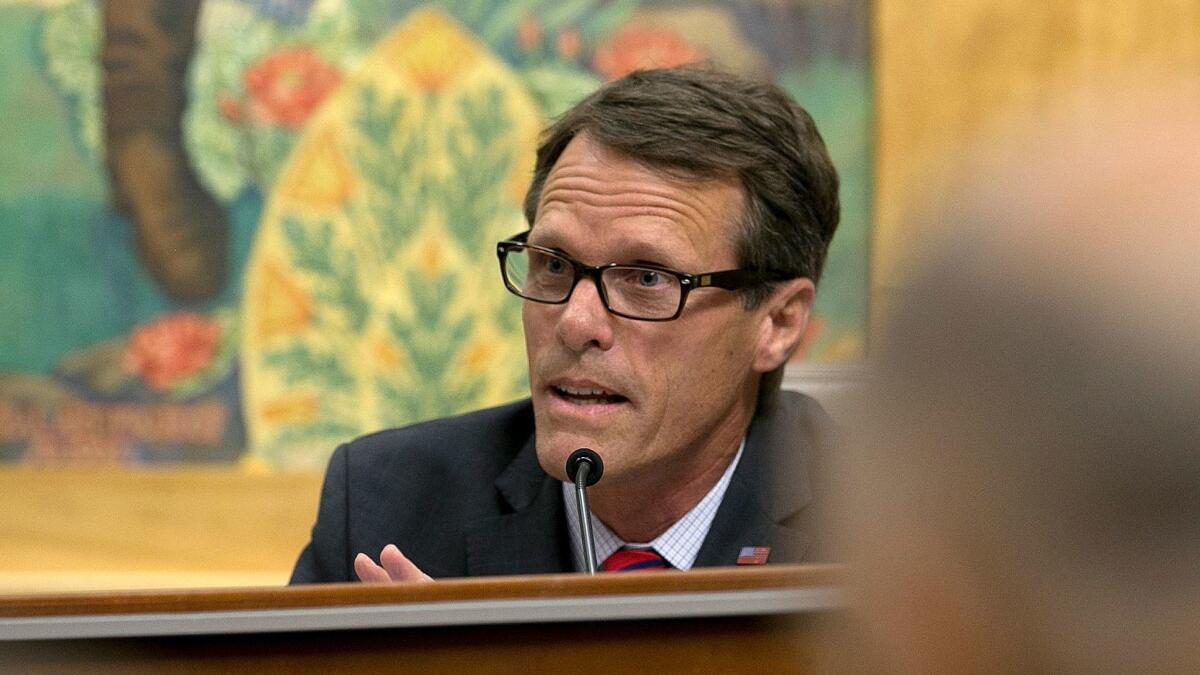Some GOP lawmakers hail suspension of fire prevention fee as victory, but others see a bait and switch

Reporting from Sacramento — A fire prevention fee levied on nearly 800,000 rural California properties was so reviled by Republican lawmakers, landowners and taxpayer groups that they tried a referendum, a lawsuit, and five pieces of legislation to repeal it during the last six years.
But this week, a measure to suspend and eventually repeal the fee was finally approved by the Legislature — after Democrats offered it as a bargaining chip to entice Republicans to help pass an extension of the state’s cap-and-trade climate program.
“This is a huge victory,” Assemblyman Devon Mathis (R-Visalia) said. “Six years ago the fire tax illegally forced people in fire-prone areas to pay $80 million a year, and not one cent has gone to putting more boots on the ground.”
But other Republicans say the suspension came with a price, and some feel the price was too high. A lawsuit challenging the fire fee and seeking refunds will continue to be pursued, activists say.
Most Republicans voted Monday against the bill that extended the cap-and-trade program, which requires oil companies and other polluters to buy permits to release greenhouse gases. Critics noted it could have the effect of increasing gasoline prices by 24 to 73 cents a gallon by 2031, according to the nonpartisan Legislative Analyst’s Office.
“I view it as a bait and switch,” said Sen. Ted Gaines (R-El Dorado Hills), the leading legislative opponent to the fire fee. “People may think that with the moratorium on the fire tax that that is a good thing, but you’ve got to weigh that against the cap-and-trade impact on gasoline and energy in California.”
Democrats touted the end of the fire fee and a commitment to cover fire prevention expenses with cap-and-trade revenue as a fair way of paying the expense while also tackling the serious problem greenhouse gases cause for the environment.
“With the existential threat posed by climate change, we have to move forward,” Assembly Speaker Anthony Rendon (D-Paramount) said. “Make no mistake, this is a win for California.”
Gaines authored five bills in the last six years to repeal or limit the fire prevention fee, which was approved during the budget crisis of 2011, charging up to $153 per habitable structure in brushy and wooded areas at high risk for wildfires.
Republican lawmakers saw the fire fee as especially objectionable because it was pushed through at the 11th hour that year to help balance the deficit-plagued general fund after Republicans refused to help provide the two-thirds vote for other tax hikes.
Some $200 million was taken from the Department of Forestry and Fire Protection for the general fund with the money replaced by the fee.
With many Republicans representing rural areas, the fire fee was widely seen as partisan punishment.
The new fee was touted by Democrats as necessary to provide fire prevention services including brush clearance, property inspections, mapping of fire danger areas and emergency evacuation planning. The cost of those services will now be borne by some of the revenue from cap and trade.
Documents obtained in the lawsuit show much of the money went to maintaining programs that had existed long before the fee.
Gaines immediately launched a referendum drive to repeal the measure but said the rules that require obtaining 505,000 signatures in three months made such a campaign difficult without a lot of money.
None of his bills never made it out of committees for a floor vote in the Democrat-controlled Legislature.
“For six years, ruling Democrats have extorted money in the form of a fire tax from hundreds of thousands of rural Californians, including many seniors on fixed incomes,” said former Republican state Sen. George Runner, a member of the state tax board.
In addition to the legislative attempts, the Howard Jarvis Taxpayers Assn. sued, saying the fee was an illegal tax because the Legislature did not approve it with the two-thirds vote required of tax increases.
The class-action lawsuit has survived several challenges, and a trial court decision could be reached in early fall, said Jon Coupal, president of the taxpayer group.
The group will continue to pursue the lawsuit despite Monday’s vote.
“It’s a suspension [of the fee], not a repeal, and what government can give it can take away,” Coupal said, adding that the fire fee could be restored with a simple majority vote. “We are concerned it may be temporary. There has been a litany of broken promises and broken deals by the Democrat majority, and this is what has us so concerned.”
If the taxpayer group prevails, the courts could order the state to repay the entire $470 million it has collected from property owners during the last six years.
Coupal agreed with Gaines that having the fire fee suspended is not a fair trade for having the cap-and-trade program drive up gas and energy costs. Republicans estimate the program costs the average California motorist an additional $400 for gas each year.
“It’s not even close,” Coupal said. “The financial hit that middle-class Californians will take as a result of this legislation is going to be enormous.”
Twitter: @mcgreevy99
ALSO
Gov. Jerry Brown says the existence of humanity rests on his climate change deal
Here’s why progressives aren’t thrilled with Gov. Brown’s cap-and-trade plan
More to Read
Get the L.A. Times Politics newsletter
Deeply reported insights into legislation, politics and policy from Sacramento, Washington and beyond. In your inbox three times per week.
You may occasionally receive promotional content from the Los Angeles Times.











